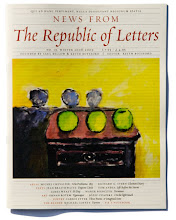Recent events (Division of Nigerian Foreign Affairs) have alerted me to the ever greater perils of daily life. There I was trolling my way through my e-mail when I glanced at the advertisements which so grace the Google pages. And there were three ads for degree courses in Homeland Security at various 'universities' of the mail order sort.
Of course it is my view that we lost the War on Terror as of 9/11 (so much more euphonious than the European 11/9). Quite simply, the sheer cost of protecting each and every one of us from those whose ambition in life (and death) is to blow us up, is a major factor in bankrupting us, giving us a set of national jitters to go along with joblessness and failed health care and insistently greedy bankers, and generally causing a slowdown in national life. A million-strong new bureaucracy of 'security' experts -- recruited only God knows how -- is now enthroned with the power to interfere in our private lives such as would never have been admissible a mere twenty years ago. I mean, did you know that any one of these people can seize your computer? confiscate you hard drive? delve into your correspondence?
Bet you didn't! But it is paradigmatic of American life that there is no niche or want that will not be filled by the Academy. Forget qualifications for degree-by-email courses: not even basic literacy is required. Some early morning hours have been spent considering the sort of curriculum a new-minted professor of Homeland Security might introduce. Here are a few sensible suggestions.
HS 101: Psychological Profiling of Terrorists: perspiration levels, bodily exudations, beard-analysis, Oedipal conflicts, criminal shiftiness.
HS 102: Linguistic Analysis: Basic Muslim, Arab oaths, translating explosive tracts, the hermeutics of stuttering, Body Language.
HS 201: Adanced Visa Studies: Detecting Voids in multiple applications, Buzz Words, detecting altered (edited) documents, Consular Analysis.
You get the picture. Background reading (for candidates who are able to read) include Kafka, Conrad, the Quran, Sharpton, Halliburton (the company, not the pre-war explorer), Basic English for Dummies, Coriolanus, Koestler.
I know this is all exaggerated, but so is the eagerness of the Education Business to pick up on every opportunity to make a buck.
Lahti
2 years ago












